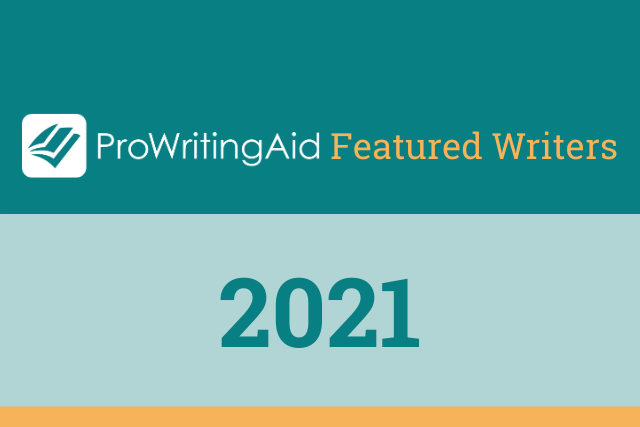
There are all kinds of writers in the ProWritingAid community, all with very different writing styles. In this new series of blog posts, we’ll be featuring one or two ProWritingAid users each month to learn more about their writing processes and how ProWritingAid has helped them on their writing journey.
Keep reading to find out how real writers use ProWritingAid, and how you could be one of our next featured writers.
- December’s Featured Writers: Jennifer Tirrell and Craig Hastings
- November’s Featured Writers: Monica Red and Brian Navarro
- October’s Featured Writers: Marty C. Lee and Barbara St. Mark
- July’s Featured Writers: Harry Colfer and Felicia Heilgendorff
- June’s Featured Writers: Liz Tuckwell and Val Tobin
- May’s Featured Writers: Steve Pantazis and Marlayna James
- April’s Featured Writer: Nathan Scammell
- March’s Featured Writers: Linda Santavicca and Tim Seabrook
- February’s Featured Writers: Kimberly Russell and Alyson Sheldrake
- January’s Featured Writers: Judith Moffitt and Fred Berri
- Would You Like to Be Featured?
December’s Featured Writers: Jennifer Tirrell and Craig Hastings
Do your characters sometimes just run away with themselves?
This month, we hear from Jennifer Tirrell and Craig Hastings on how to rein in errant characters whilst maintaining the storyline.
Find out more about their writing and editing loves (and hates!) below.
And remember, if you’d like to be one of our featured writers, all you have to do is tell us a little about your writing and editing process. Get involved here!
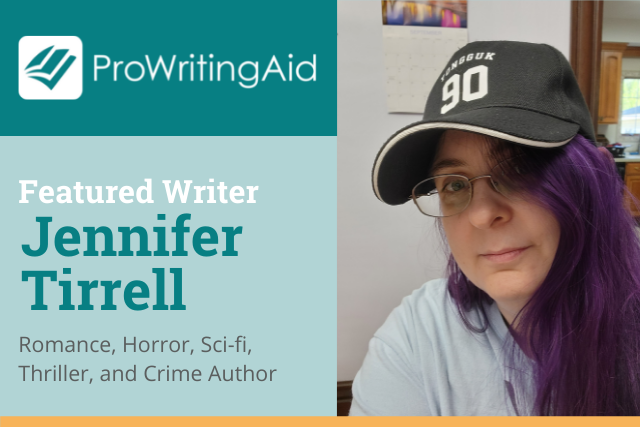
Jennifer Tirrell is a self-proclaimed jack of all trades in the writing world: from multicultural romance to horror to sci-fi to thrillers to crime, there is no genre she hasn’t explored.
Where do you find inspiration?
I mostly find inspiration from video games, music, movies, shows, kpop, kdramas, and jdramas. The characters, actors, and performers get stuck in my head, and I make up original stories inspired by them to get them out!
Tell us about your writing and editing process.
I handwrite my first draft, then edit as I type it up. I print that out, edit and revise. Then I run PWA reports a chapter at a time. My favorite reports are Grammar and Style, Overused, Echoes, Diction, Clichés, Consistency, and Fiction Style. After that, I use the Read Aloud feature in Word. My last step is ordering an author proof of my book and reading through it one last time. I do everything myself, from formatting to editing to the book cover.
What do you love about writing and editing?
I love being transported to another world that I can control... to a point. My characters love to jerk the reins from my hand and do their own thing. I’m known for not being nice to my characters. I love how the stories form and grow as I write. I’m a pantser and the end product almost always ends up being completely different from my initial idea as the story evolves. With the editing process, I love learning the dos and don’ts and applying them to future projects. I love seeing my writing improve and knowing I did that!
What do you find difficult about writing and editing?
Sometimes I get stuck on a project. And sometimes I get pulled away, kicking and screaming, by another new, exciting idea that demands my attention NOW. Typing the second draft from my handwritten first draft is tedious, though I need to do it this way. My creativity flows through a pen, not a computer screen. Editing itself can be tedious. I get restless and can only do a little at a time before I’m on to something else.
Which is your favorite ProWritingAid report? Why?
I love the Style report. I think it helps me the most. It’s a great basic report that weeds out common issues. I also have a love/hate relationship with Overused. It can be tedious at times for my brain, but I understand the importance of it!
Jennifer currently has 9 works up on Amazon that you can view here. She is also writing a piece of fanfiction based on Alice in Borderland, which can be found here.
If you want to learn more about Jennifer, why not check out her Tiktok, Instagram, or Facebook.
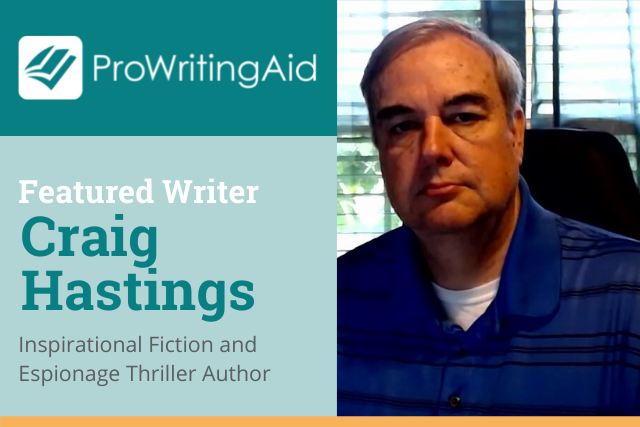
Craig discovered writing whilst trying to fill some free time and now he can’t get enough of it. He writes inspirational fiction and espionage thrillers.
Where do you find inspiration?
I mainly find inspiration from my life and from watching other people too. I like coming up with a character and then learning what they are like and the fixes they can get into.
Tell us about your writing and editing process.
I’m a by-the-seat-of-your-pants writer. I will come up with a situation someone might face and go from there. I don’t do much editing while I’m writing the first draft. But I will have ProWritingAid turned on for glaring errors. In editing there are two types: developmental and line edits. I normally concentrate on the development editing first and once I think it’s at the right place, I concentrate on line edits. This is where ProWritingAid helps a lot. I can go line by line and fix what it finds. My editors are very thankful for this. But they still find stuff. Plus, they can be mean.
What do you love about writing and editing?
What can I say about writing. When I first started, it was more to fill the free time I used to have. But then I realized how much I was enjoying having the characters develop and share about themselves. Having the plot twists appear while I was writing was way more fun than reading them in a book. I still enjoy reading, but writing is a completely different level. As for editing, the only ones I know who love anything about editing are editors. I’m so glad we have these folks to count on, but as I said earlier, they can be mean.
What do you find difficult about writing and editing?
Sometimes the story wants to go a different direction than I want. If I try to force it to go my direction, I soon hit a point where it seems lost and have to go back and let the story play out. As for editing, my day job is as a computer programmer and as most of us, I’m terrible at grammar. Plus, what’s with all the exceptions in English?! Can’t we have hard and fast rules? But what I hate the most is commas. They are evil I tell you, and they team up with editors.
Which is your favorite ProWritingAid report? Why?
That would be a tie between the Style and Dialogue reports. The first I’m sure is obvious given my comments elsewhere. But the dialogue helps me with the tags and allows me to concentrate on the dialogue alone without being caught up in the story. When you can look at only what and how it is being said, it allows issue to become more obvious. But there are several more that are invaluable, like Readability, pacing, and the summary which provide a quick report on the entire manuscript. They let you lock in on the problem areas.
If you want to learn more about Craig’s works you can check out his website or view his novels on Amazon.
If you want to follow Craig’s process, you can follow him on Facebook.
November’s Featured Writers: Monica Red and Brian Navarro
How do you find time to write?
This month, we hear from Monica Red and Brian Navarro with their top tips for fitting a writing schedule into a busy life.
Find out more about their writing and editing loves (and hates!) below.
And remember, if you’d like to be one of our featured writers, all you have to do is tell us a little about your writing and editing process. Get involved here!
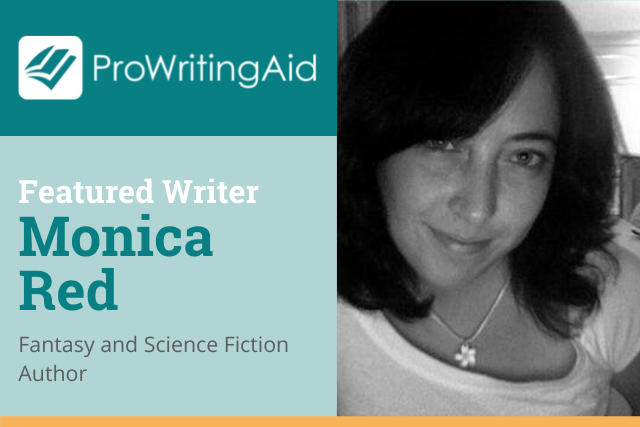
Monica Red is a Fantasy and Science Fiction fanatic who loves the editing process. She writes books, short stories, and blog entries.
Where do you find inspiration?
A lot comes from my always active mind that keeps daydreaming. The stories in my head talk about places I have visited, people that I met, and things that I learned or read along the way. That’s where everything starts.
Tell us about your writing and editing process.
I’m not a complete plotter but I need to create a rough list of scenes and usually I have a clear idea about the ending of the story. Of course everything changes while you write the first draft and then again when you edit it. As for editing, I work one scene at the time, and I usually end up re-writing most of my manuscript. Next I do development editing (Fictionary is great for it) and then I start using ProWritingAid for the rest of the editing process. Once I feel the manuscript is ready, I send it to a line editor, re-read and edit as needed. Finally I send it to some beta readers and I’m done! Well, not really, I then make more changes, proof editing, and re-read it one more time.
What do you love about writing and editing?
Writing to me is like playing again! This time, I don’t use toys but a keyboard. Editing is getting serious about the job done, and I love it! This is where all begins to make sense, and the excitement to share it with others begins.
What do you find difficult about writing and editing?
Time! I think most of us have a difficulty finding the time to sit down and write. Life happens and usually writing isn’t on the high priority list; kids, house, family, school, homework, etc. It takes more convincing (to myself) that it is important, and I should also work on it.
Which is your favorite ProWritingAid report? Why?
Sticky sentences has a special place in my heart. Once you upload a scene and run the report, I usually feel despair and frustration. However, once I work on it, this is where most of my work improves and gets shape.
You can learn more about Monica here: www.monicared.com. You will find blog entries, books and even episodes from her podcast; Birds on Topic, where she talks with her daughter about anything and everything in a family friendly conversation.
You can also follow her on Facebook or Instagram.
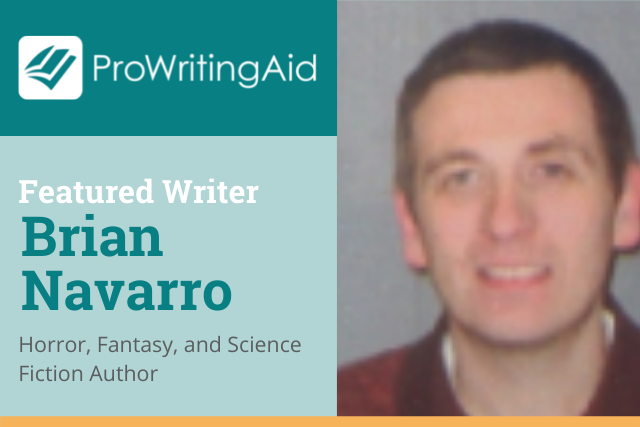
Brian writes horror, fantasy, and science fiction. He gears his stories toward young adults seeking to re-imagine their world and renew their sense of self. But like most authors, he dabbles outside of his comfort zones and creates shorts in other genres to experiment.
Where do you find inspiration?
As cliché as it sounds, life inspires me. Sometimes it’s a dream I had—weird owl creatures attacking; me running from a loony in a hospital; or peering into a dark tunnel drilled into the center of Mars. Other times what’s happening in the world will inspire me: watching a movie, reading a book, attending a winter festival, or talking with a parent. Inspiration is everywhere, you only have to open your senses. I always keep my phone handy to add to my catalogue of story ideas.
Tell us about your writing and editing process.
In writing my debut novel, I found writing is the easy part: conceive of an idea, write fifteen hundred words per day, five days a week, and finish an 80000 word manuscript in a couple of months. Done, right? Nope. Editing is where we make art.
A self-edit happens in stages and can stretch a year or more (five years so far). After the initial draft, I apply a reverse outline to develop a plot draft (took me seven rewrites). Then, I employ a big-picture editor for an assessment and revise it until the plot works. On the shiny new copy, I use the Story Grid system to study its technical features (scenes, sequences, etc.), and Storyteller software to consider its creative elements (senses, POV goals, etc.) to produce a story draft. Finally, I hire a story editor for a deep dive and revise it until the story works.
What do you love about writing and editing?
I love being able to sit down and travel elsewhere at will. Every day, I write at least 500 words on a random idea chosen from my catalogue of ideas using Google’s random function in spreadsheets. I spend fifteen minutes in the morning writing in bed, then twenty to thirty on the couch in the evening finishing up my word count.
For editing, I love discovering the story. Sure, when you write you find the plot, but when you edit, you uncover what it means. You travel into the deepest and darkest miseries of a character and unearth the incredible strength they have. It’s sort of humbling that you get to tell their story.
What do you find difficult about writing and editing?
The hardest part of writing and editing is sharing my work with another human being.
With writing, I’m sharing it with readers. They may be beta readers, arc readers, or the public, but they’re my target audience and I want to make a good impression. With editing, I’m sharing it with a paid editor and wondering: is the current draft the best possible I could do?
Which is your favorite ProWritingAid report? Why?
My favorite is the echoes report. It’s the newest I’m using and I love how much it changed a recent horror short story I submitted to a magazine. I’ve found fixing close repeats can transform a humdrum story into a thrilling one. Each highlight encouraged me to swap a poor habit of repeating superficial details with a better habit of digging for the truth.
You can find out more about Brian on Tumblr and on Flash Fiction Magazine.
You can also follow Brian on Twitter.
October’s Featured Writers: Marty C. Lee and Barbara St. Mark
How do you work through your editing process?
This month, we hear from Marty C. Lee and Barbara St. Mark about their own experience with self-editing.
Find out more about their writing and editing loves (and hates!) below.
And remember, if you’d like to be one of our featured writers, all you have to do is tell us a little about your writing and editing process. Get involved here!
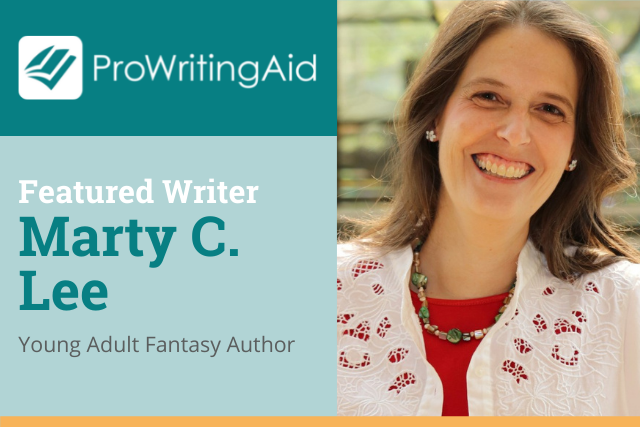
Marty C. Lee is a young adult secondary world fantasy writer, who utilizes multiple point of views to elevate her characters. She’s typically mean to her characters as the story progresses to mid-story but don’t worry, they always have a happy(ish) ending.
Where do you find inspiration?
I really don’t know. It just comes when it needs to. My brain usually waves it around triumphantly just when I’m about to give up. I keep a notebook by my bed to capture just-before-sleep revelations, which helps a whole lot when I fall in a rut.
Tell us about your writing and editing process.
Once I have enough of a plot developed, I’ll write about half a chapter a day. I think I’ve finally learned to leave author notes for later instead of stressing about exact wording or research when I ought to be producing words. When the first draft is finished, I self-edit, then send it through my critique group. Then I self-edit again several times (or many many times). Depending on the story, I either send it to an editor next or to beta readers, editing between rounds. When I stop getting "please improve" feedback, then I run it through ProWritingAid for fine-tuning, then it’s off to proofreading.
What do you love about writing and editing?
I love creating a new world and being able to meet new characters. Discovering what happens to my characters when I throw them into trouble is really exciting for me. Making my words say exactly what I want them to say to show readers my world and characters. Eliciting an emotional response from my readers that make them cry and flip the page back to read it again. Those really are the strong points of writing.
What do you find difficult about writing and editing?
Making my words say exactly what I want them to say. It gets a bit tedious to fill in plot holes and I find that accurately sharing emotion is a bit hard. Then there’s rewriting 50 times to fix everything.
Which is your favorite ProWritingAid report? Why?
I really like the House report, because I can check for all my world-specific details and word choices. Things like, who says pants vs. trousers? Who says can’t vs. cannot? Did I use "human" anywhere?
(The House Report is now Style Guides. Check out this post to see how they work.)
You can find out more about Marty on her website. You can get her free short story collection here. Be sure to check out her very first book and read more about Marty on Bookhub and Goodreads. You can find Marty’s books on Amazon or request the books at your local library.
You can also follow her on Facebook.
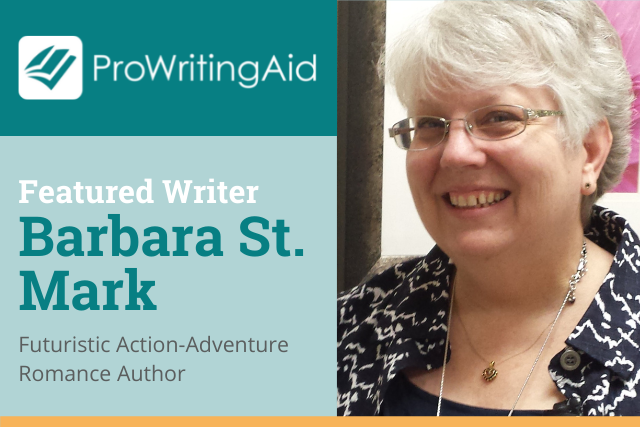
Barbara St. Mark, who goes by "Barb," writes action adventure romance which she sets in a futuristic society.
Where do you find inspiration?
All around me. But usually it’s something I have thought about and then read an educational post on which triggers something in my memory and I think, "Ah, there you go." And then I write.
Tell us about your writing and editing process.
I use ProWritingAid and have it turned on all the time. I may not pay attention to it other than to quickly fix spelling errors while I am actively writing. But after I have finished the scene or chapter, I will run through various reports to see where I may want to fix items.
What do you love about writing and editing?
I love getting the story out of my head and onto the paper. This is something new to me (within the last year), but I have already written two novels and am writing the third in a series (in first draft format), before I start the full editing process.
What do you find difficult about writing and editing?
Setting a good time line. My serial story starts with the first couple in the first book. But, the second story overlaps time frames, and then the third one begins before the first one ends and carries on. It is hard to remember who knew what when. But I just bought Plottr and hope this will help me with this as I move forward.
Which is your favorite ProWritingAid report? Why?
This is hard to answer as I use most of the reports. I use the add-ons PWA for word, so I like the summary to start with and then will do readability or sticky sentences. I have to be careful to not over edit. That is again the beauty of PWA. You don’t have to do any of it... you can pick and choose your editing, to fit your style of writing.
Barb hasn’t published anything yet (except professionally and a career ago), but when she does, it will be under the name Barbara St. Mark. She has a website where you can sign up to get a short story.
You can also follow her on Facebook.
July’s Featured Writers: Harry Colfer and Felicia Heilgendorff
How does your work appear in your writing?
This month, we hear from paramedic Harry Colfer and neuroscience graduate research fellow, Fia Coldwell about how their working day finds its way into their stories.
Find out more about their writing and editing loves (and hates!) below.
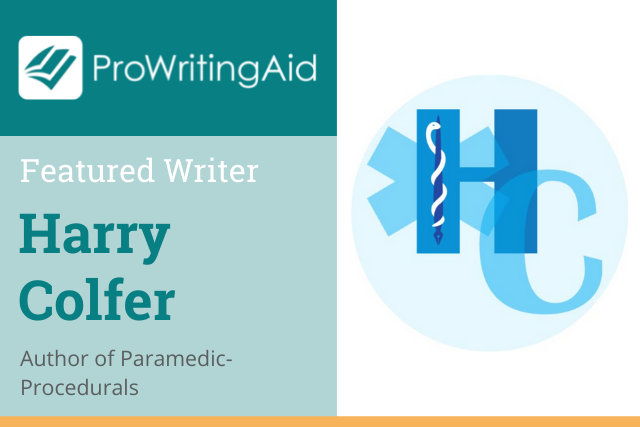
Harry Colfer is the author of murder-mystery novel, Dead Regular, and the short story series "Ambo Tales from the Frontline," which he says are best described as humorous paramedic procedurals! Harry has given writers in our ProWritingAid Writing Partners in Crime Facebook group some great insider knowledge, so we’re excited to hear more about his own writing process.
Where do you find inspiration?
Well, as a paramedic still working Brisbane’s frontline, my inspiration is supplied on a daily basis! Although I do write under a pseudonym, all my stories are fictional and only loosely based on jobs I’ve been to, or heard of. Obviously, I need to keep in mind any perceived conflict of interest and ensure no breaches of patient confidentiality. Although I would love to write full time, I can’t afford to risk my current day job!
Tell us about your writing and editing process.
I tend to write my first draft using Scrivener on my iPad. Working full-time means I’m often restricted to writing when the family’s sleeping, and as the iPad is backlit I can tap away in the pitch dark! The first draft is then read by my "alpha reader" aka The Missus. She’s a grammar nazi, my biggest fan, and harshest critic. Over the years I have encouraged her to expand on, “This is crap.” Now I just smile and nod as I die inside. Further rough editing is all done in Scrivener, often on my Mac, and then I pass it through ProWritingAid. The latter is an essential part of my writing, often before any beta readers get to see my work through a system called BetaBooks. I’ve managed to accrue a dedicated team of proofreaders, so to date I haven’t had to shell out on editing expenses. ProWritingAid does that for me!
What do you love about writing and editing?
Love is such a strong word. Writing amuses me and helps me deal with the day-to-day stresses of my paramedic role. And before you ask, that’s not the blood and gore stuff, I rarely have a problem with that. If you read my stories, you’ll probably guess it’s to do with inappropriate ambulance call outs and the inherent bureaucracy of government institutions. Anyway, writing lets me vent in a fictional reality, hopefully in a humorous and engaging way.
What do you find difficult about writing and editing?
As for editing, although ProWritingAid makes it easier, I still find it a chore. That said, it pales into insignificance when compared to marketing. Fingers crossed someone develops an app like ProWritingAid that suggests, deals with, and manages all aspects of marketing for the self-published author!
Which is your favorite ProWritingAid report? Why?
Sentence Length. It only takes me a few seconds to glance at the graph and say, “Cool.” Seriously, All Repeats combined with Echoes. Apart from this being the last set of reports I run (which means I’ve finished another chapter), I have a tendency to repeat phrases/words and as a reader this really bugs me. I therefore find it important to fix this issue in my writing.
You can find out more about Harry on his website and buy his books on Amazon.
You can also follow him on Facebook.
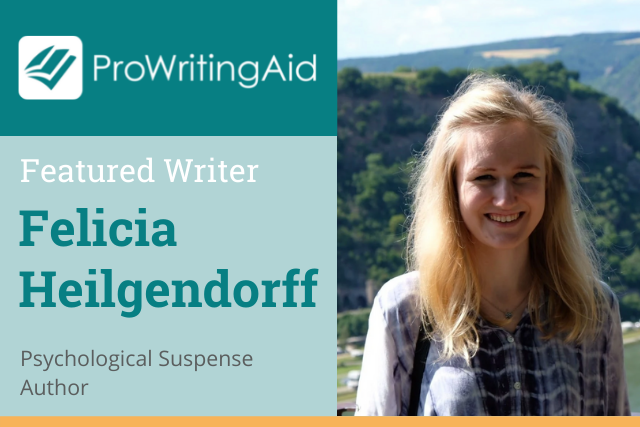
Felicia Heilgendorff writes psychological suspense, thriller and noir flash fiction and long-form under the pseudonym Fia Coldwell. Currently, she is working through and editing the first draft of a psychological suspense novel which she hopes to submit to agents once finished.
Where do you find inspiration?
I find a lot of inspiration through the world around me. As I have a background in psychology, neuroscience and cognitive science, I have a lot of scientific input on a daily basis. I also draw a lot of inspiration from the books I read and I try to read widely, not only in the genre I’m writing in.
Tell us about your writing and editing process.
I have recently found that I work best as a planner. I initially come up with the seed of an idea and randomly jot down notes what could happen, who the characters could be etc. I then try to put my thoughts in order. Usually, the characters come first and I then draw up a plan of plot points that I could see happening. I then plot out each chapter I’m going to write with a small paragraph, which helps me remember what I want to write later on. This made the writing process whizz by in no time. With the outline in place and the first draft done, editing is much neater and I’m able to go through each chapter one by one, working mainly on line edits.
What do you love about writing and editing?
I love coming up with characters and weaving a story around them. I love the initial phase of writing, where everything is still new and you can paint a picture with words based on the images I see in my mind. It’s amazing how we can transfer the movie playing before our inner eye into writing, so that other people can be a part of it too.
What do you find difficult about writing and editing?
I find it difficult staying focused while editing, mainly because the novelty of writing something new wears off. This was especially difficult for me when I didn’t have an outline before writing the first draft, resulting in far too many plot holes that couldn’t be fixed. With an outline in place, it has already become easier to stay focused. It’s still difficult because it requires real work being done in order to transform the first draft into something brilliant.
You can find out more about Fia on her website.
You can also follow her on Instagram.
June’s Featured Writers: Liz Tuckwell and Val Tobin
How do you deal with criticism of your writing?
June’s featured writers talk about how critiques fit into their editing processes, the software they use to write, how tarot cards can provide inspiration, and more.
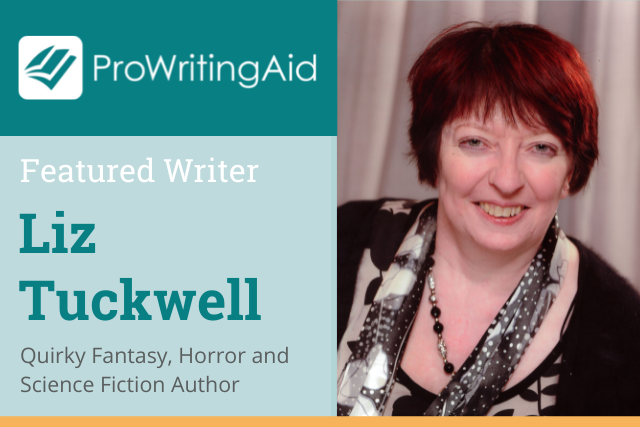
Liz Tuckwell is a quirky fantasy, horror, and science fiction author. She loves putting her own spin on the Fantasy genre, writing alternate historical fantasy, urban fantasy and fairytales with a twist as well as the odd dystopian and fantasy horror story as well.
Where do you find inspiration?
I find inspiration from history, mythology, the news when it’s odd or strange, movies, friends the world at large and my own rather strange mind.
Tell us about your writing and editing process.
I used to write in Word but then I found Scrivener, which is so much better because you can keep your notes with you instead of having to go into another program. I still haven’t used every feature in Scrivener but it’s very useful. I use ProWritingAid for double checking my spelling and for the initial edit before I send the draft out to critique groups. PWA has helped me to realise I have some bad habits such as using "just" too much, although I don’t always agree with every suggestion it makes.
What do you love about writing and editing?
I do love drafting a story most. I love the rush of getting the words down and seeing the story emerge. There’s such a sense of accomplishment when you finish. I must confess I prefer it to the slog of editing. But it is very satisfying when you finish editing and know that the story has been improved from its original state.
What do you find difficult about writing and editing?
I don’t find the drafting part too difficult normally. It’s my favorite part of the process. I do find editing more problematic. It’s amazing how you can read your own work and not catch mistakes. And sending out my work to be critiqued after I’ve run the story through ProWritingAid, and nerving myself to look at the comments can be stressful. Some people have a harsh way of critiquing and I’m a sensitive soul. And then it’s a matter of deciding if you agree with the comments or not and what you’re going to change. I do normally agree with an editor’s comments, though, when they send the document back for final revisions.
Which is your favorite ProWritingAid report? Why?
My favorite ProWritingAid report is the grammar report because I feel that’s the backbone of good writing, you need to get the grammar correct. There’s something very satisfying going through and seeing the errors go down. And I think everything else builds from that. I know many readers, myself included are put off stories with poor grammar and spelling.
You can find out more about Liz on her website and buy her books on Amazon.
You can also follow her on GoodReads, Twitter and Facebook.
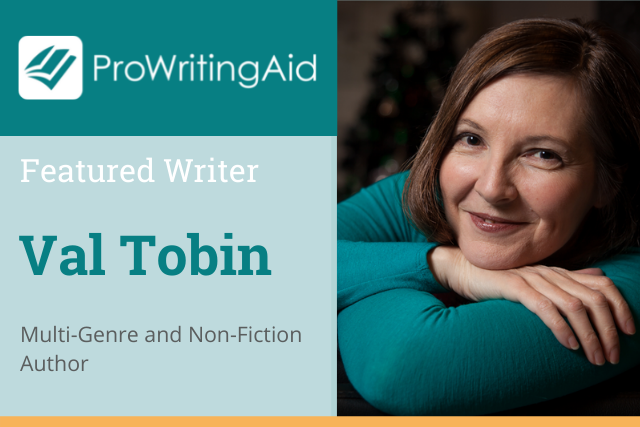
Val Tobin is a multi-genre author, writing paranormal sci fi thrillers, horror, romance, urban fantasy, as well as nonfiction articles for magazines, online content and a non-fiction book.
Where do you find inspiration?
Everywhere from books to people to news articles to tarot cards.
Tell us about your writing and editing process.
I plan out the story using Snowflake Pro and a Scrivener template. When I write the first draft, I write every day and finish in three months.
I put the completed first draft away for six weeks and work on another project. After that, I print up the first draft and make notes as I read. I do revisions and run it through ProWritingAid as I review it again.
Then it goes to my developmental editor. I revise again, run it through ProWritingAid, send it to beta readers, revise, run it through ProWritingAid again, send it to my editor for line editing, clean it up, send it out for proofreading, clean it up, and then upload it to Amazon for pre-order.
I’ll review the manuscript a few more times before the release date using different devices to verify how it looks and to catch any remaining typos.
What do you love about writing and editing?
I love to see the progress of a manuscript from raw prose to polished work.
What do you find difficult about writing and editing?
Commas. Their presence or absence can change the meaning of a sentence substantially.
Which is your favorite ProWritingAid report? Why?
My go-to is the Summary Report because it provides an overview of what’s happening in the piece I’m working on. I love the new "Goals" and "Grammar and Style" reports that now display on the left of my browser.
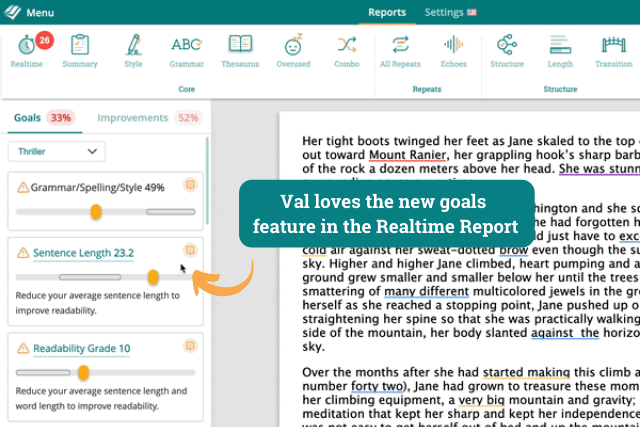
You can find our more about Val and her work on her website, blog, on BookBub, ALLi and Amazon.
May’s Featured Writers: Steve Pantazis and Marlayna James
Do your characters tell you what to write? Are repeated words your writing nemesis? You might just have something in common with our two featured writers for May, Steve Pantazis and Marlayna James. Keep reading to find out more about their writing and editing processes.
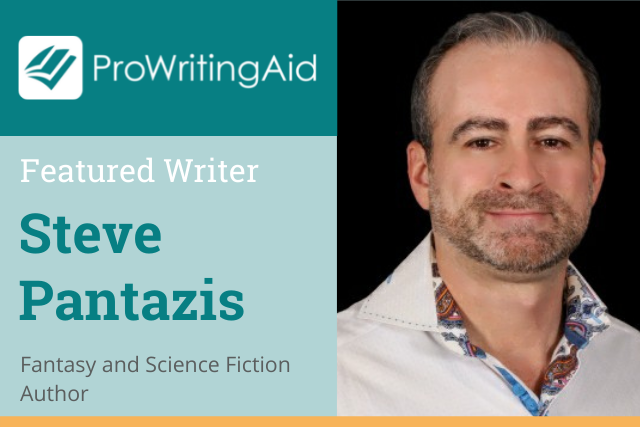
Steve Pantazis is a Fantasy and Science Fiction author. He is currently writing a 9-book Epic Fantasy series that he plans to rapid release on Amazon late in 2022.
Where do you find inspiration?
I find inspiration from Fantasy greats, like J.R.R. Tolkien, G.R.R. Martin and Pat Rothfuss.
Tell us about your writing and editing process.
Writing: For draft 1 of a scene, I often plot it using a few bullet points, then write the first draft using Microsoft Word. Half the time, something changes organically as I write, but it’s often for the best.
Editing: For draft 2, I’ll reread the scene and apply changes. For draft 3, I’ll use ProWritingAid’s add-on in Word and identify grammatical errors and repeated words (my nemesis). For draft 4, I’ll use Word’s built-in Speak function to read the text aloud to catch additional errors.
What do you love about writing and editing?
My favorite part of writing is discovering the unexpected. This usually happens when I enter the "flow state," where the words just pour out. It could be an unanticipated shift in dialogue or tension, a surprise twist or a change to the scene that makes it better than the original idea in my head.
For editing, it’s "coloring in the details," as I call it, where I add flourishes that enhance the reader’s experience, like adding a sight, sound or smell that wasn’t there before but improve the scene in a small but meaningful way.
What do you find difficult about writing and editing?
Writing the first draft is the hardest, because it’s new material and there’s a lot of difficult work involved with crafting descriptions, character interaction, dialogue and cliff hangers, as well as getting the plot points and pacing right.
With editing, the hardest part is killing your darlings. You want to hold on to an epic description of a castle, but realize that the pacing demands a single line of description to keep the story flowing, and so you toss that description. Or tear out entire blocks of dialogue because they are irrelevant. Or discard a scene because it doesn’t further the storyline.
Which is your favorite ProWritingAid report? Why?
Without a doubt, the Echoes report. Kryptonite is to Superman what repeating words and phrases is to me. I shudder to think what I’d do without the Echoes report. In fact, years back, I posed the question to the moderators of a panel on editing, begging for insight into a Microsoft Word macro that a hobbyist might have cooked up to find repeated phrasing. No one knew. Then ProWritingAid came along, and the rest is history.
You can find out about Steve’s current and forthcoming works on his website and Amazon author page.
You can follow him on Facebook, Instagram, Patreon, Twitter (@pantazis) and Pinterest.
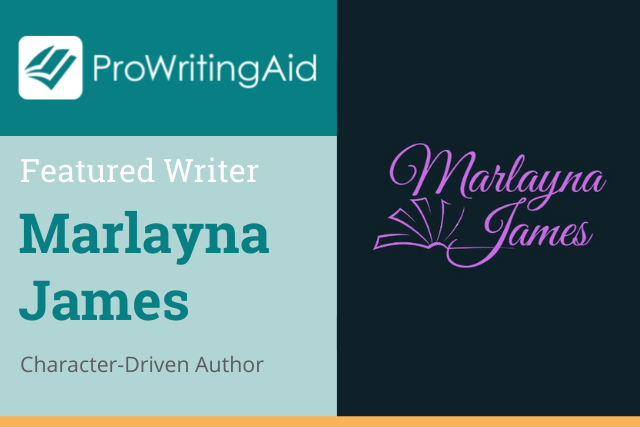
Marlayna James takes a character-first approach to writing. Find out more about her process below.
What do you write?
I’m not an author who can be genre-bound, I’m loyally bound to my characters no matter what story they reveal. I let my characters tell their stories without criticizing their actions, without working their stories and without interference.
I feel their pain and cry. I feel their love and smile. I feel their embarrassments and redden.
Where do you find inspiration?
My characters come to me after they invent themselves, like an old friend. Often times, they nudge me until I write whatever they have to say. I use my family, friends, and circumstances as inspiration at times, but [when I try to] plan and my characters laugh at me. I have made many character sketches and many story maps and my characters bust a gut laughing over the mess they make of them.
Tell us about your writing and editing process.
I usually start by interviewing a single character. What’s his/her problem? Then l create everything around them—their world, their family and their loved ones.
I start with a rough mind map and write. It doesn’t all come to me at once, so while I’m waiting for the next conversation from one of my characters I go back to the beginning.
I reread and add things I may have missed, then I pop my mouse over to ProWritingAid. First, I run the grammar/style check and fix those issues. Secondly, l run the sensory check then the thesaurus report. Third, I run the readability report and lastly, the summary. Then start this process all over again.
What do you love about writing and editing?
I love my characters, their stories and creating worlds for myself and others to get lost in. I want a reader, even if only for a few minutes, to be swept into a world or life which isn’t their own.
If you asked me before PWA, I’d of said I loved writing because it was an ability I excelled at. Now, I’d have to say PWA has enabled me to be ten times the writer l was.
What do you find difficult about writing and editing?
I find descriptions are my nemesis. I like the character interactions and blow through the description parts. The most difficult part of editing is remembering to go back and edit then edit and edit again. The never ending list of things to go back and look for.
Which is your favorite ProWritingAid report? Why?
I don’t do well with "showing, not telling." In the past, I had a checklist I would use but now I’m able to focus more on writing and let PWA tell me where I’m missing these important opportunities. I also, enjoy the summary report pitting myself against industry standards and other authors I admire then seeing how I stack up. Sometimes, I go back to fix it but other times, I need to be me.
You can find Marlayna’s work on Inkitt and Wattpad. You can also follow her on Facebook, Twitter (@marlaynajames) and Clubhouse (@marlaynajames).
April’s Featured Writer: Nathan Scammell
Nathan Scammell is a YA Fantasy author who is about to publish his first book. He also moderates ProWritingAid’s Fantasy Writers’ Fellowship on Facebook. If you’re looking for a community of fantasy writers, come join us!
You can also listen to Nathan’s podcast, Nathan on Writing, over on Spotify. Check out his interview with ProWritingAid’s Hayley Milliman all about building your author platform.
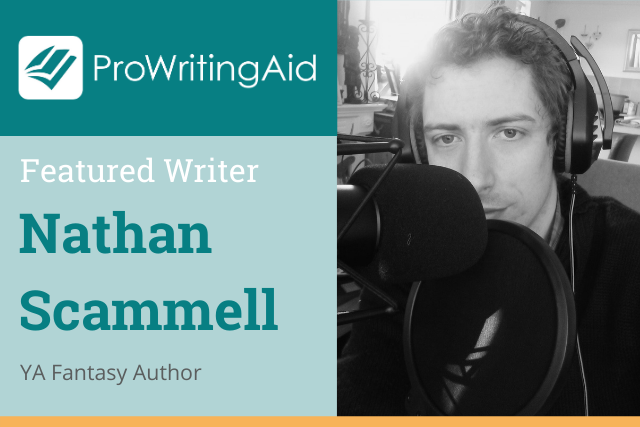
Where do you find inspiration?
I get a lot of my inspiration from telling my children bedtime stories. It’s a pretty big deal in my house if there is no story time before bed and this has been going on for six years now! I love the fantasy genre and I love thinking of new and exciting worlds.
Tell us about your writing and editing process.
I am very much the definition of a pantser. I start with an empty document with an idea in mind and just start typing away. There’s no plan and there is no looking back. Then when the story is complete, I like to print it off. There is no better feeling than having a printed manuscript in your hand. I like to edit with a red pen (old school style) before typing it back up then running it through ProWritingAid. It’s amazing the amount of things the program picks up.
What do you love about writing and editing?
I love using the creative side of my brain. I love to make people think, laugh, cry, and really invest themselves in one of my stories. It has always been an ambition of mine to be a writer and now I have taken the plunge to do it. Every day excites me.
What do you find difficult about writing and editing?
I am a master procrastinator. The hardest part of being free to explore my creative side is sitting down and doing it. I am easily distracted. I once spent three hours watching videos on how you can look like you know how to play piano without actually learning it. I don’t even have a piano! The hardest part about editing is when something you are really proud of just does not work in the story and you have to remove it. Killing your darlings, as they call it, it can be so difficult.
Which is your favorite ProWritingAid report? Why?
The passive voice suggestions in the Style Report, definitely! I was always so proud of my ability to use active voice until ProWritingAid came along. I always used to say I never used passive voice; the report has certainly humbled me. I am glad that it shows me before I release anything.
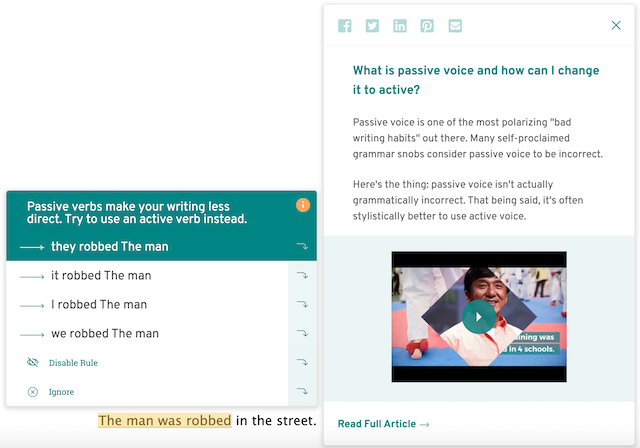
About Nathan’s Work
Nathan’s debut novel will be released on 1st May on Amazon and all other eBook providers.
You can follow him on Facebook, Twitter or Instagram
March’s Featured Writers: Linda Santavicca and Tim Seabrook
March’s featured writers are Linda Santavicca and Tim Seabrook. Linda is currently outlining her first fiction novel, and Tim will be publishing a fantasy novel later this year. Find out more about their processes and where they find inspiration below.
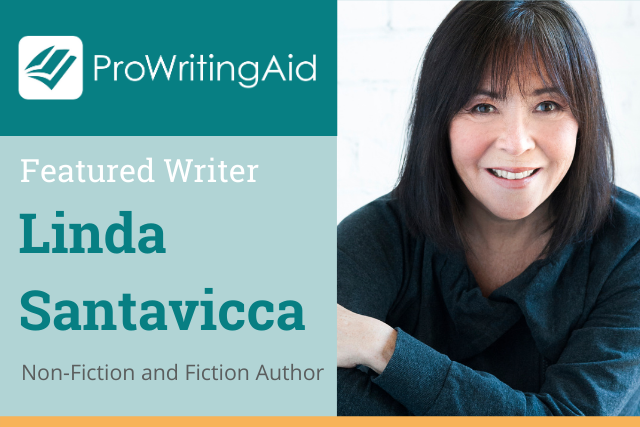
Writing inspiration comes from all kinds of places. In this featured writer interview with Linda Santavicca, she explains how her surroundings, faith, and love of sport inspired her as she took the leap into writing fiction. Over to Linda!
What are you writing?
My first manuscript was faith-based, non-fiction however, since I am a Board member and co-editor to an online newsletter and a blogger for a non-profit, I am not locked into any specific genre. Currently, I am outlining my first fiction novel.
Where do you find inspiration?
Given I am curious and interested in so many things, it’s hard to pinpoint my core inspiration,but for starters, it comes first from my faith. I am defined by what I believe. As a professional in the performing arts, I get fueled by music, theater, and film. And, as an athlete, my daily runs and seasonal snow-skiing trips continue to invigorate me, not just physically but emotionally. My love for the mountains bolsters my spirit, especially from a chairlift. I find all relationships to be inspirational whether they are healthy ones or ones that challenge me. But again, it’s my faith that inspires me the most.
Tell us about your writing and editing process.
After several drafts, I edit as best I can so that I can pass it on to a professional developmental editor. My last editor not only did the developmental editing but also the line editing as well as the proofing.
What do you love about writing and editing?
How the first draft is just a glut of words. Some of it makes sense but if it fell into the hands of a reader, ouch! But, as a writer, I love taking the first draft and running a machete through it as well as adding more details to create a second draft that encourages me to keep going. By the time the first draft has gone through the wringer several times, the story comes to life. But the best is when I get to tweak the final draft. From start to finish, the process is like watching a film being shot out of sequence and then seeing it on screen. Mastery!
What do you find difficult about writing and editing?
I love to write but when I have a million other commitments, I lose my drive. Once I find order and focus, I can write. Before the pandemic, I went to the library every day from 9 a.m. to 2 p.m. to write. The library gave me space and time to make progress. Once the country went into lockdown, the library shut down and thus, I had to write from my home office. I continued my daily discipline, but it was an adjustment.
As for editing, at first it was a real learning curve. My editor worked on my manuscript through Google docs where she made comments to the side of every edit and explained the changes and why. Through that process, I learned much about writing and editing and all by working virtually with my editor. It was a real perk to learn the nuts and bolts of editing while my manuscript was being professionally edited.
Which is your favorite ProWritingAid report? Why?
The Readability Report: I think the tendency to use big words in order to appear educated and/or unique can sometimes be a hindrance to the reader. I have learned to keep it simple without being redundant. Good writing is not about being affluent in knowledge but about being an influence and invigorate curiosity.
About Linda’s work
You can find out more about Linda’s work and writing process on www.lindafroehlichsantavicca.com and www.pressingbeyond.com, and follow her on Instagram, Twitter, and Facebook.
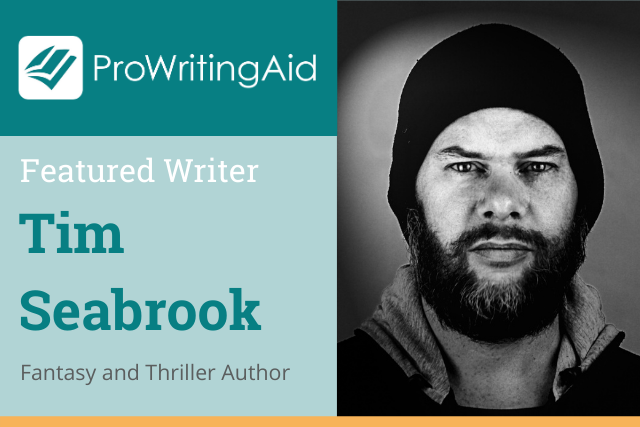
Tim Seabrook is a fantasy and thriller author who used to hate editing and then had a change of heart. Find out why in this interview! Over to Tim.
What are you writing?
The current project is dark fantasy fiction set in its own world, which my co-author and I have developed from scratch. I also have a murder thriller set during Victorian times in the planning/research stage that I am writing alone.
Where do you find inspiration?
I get inspiration from conversations with friends, TV, film, books, and life all around me. Like describing the crew being shaken during a rocket launch by comparing it to riding a suspension-shot bus on pot-holed roads, or walking through the maze of corridors of an indoor market and using that as a floor plan of a city.
Another bonus for me is living in a foreign country. It provides a cultural diversity to perceptions and actions and how I look at them, which makes adapting them to a story all the more fun.
Tell us about your writing and editing process.
Okay, let’s split this down.
Writing—I have tried doing this both ways, pantsing and plotting, and without a doubt, plotting is the only way I can make a story progress and make sense. I try to keep outlines brief with the basics of who, where, and why, and then build from there. I use Scrivener to write with. Its metadata sections are a lifesaver for tracking characters and events, as well as ensuring I’m using all the senses.
Editing—Working with a critique partner helps to identify issues during the writing stage. After that, the first edit is a full printout and red pen affair, usually in coffee shops or a park (during summer) where there’s no distraction of the internet and social media. After making those edits, it’s fine tuning the grammar, punctuation, etc. using ProWritingAid’s desktop software and a tolerant hand to not make further changes.
What do you love about writing and editing?
I love the flow of words as they pour out onto the page. Seeing a world and its characters develop a life of their own and then being able to share them with others. Working with a co-author adds another dimension to that and makes the writing process more involved. It’s an addictive process and the more I write, the more ideas seem to wait in the wings.
If you’d have asked me when I first started editing, the categorical answer to what I loved about it would have been a resounding “Nothing!” But as I progress down this road and learn more about the process, I have found the first draft is a muted version of the story and the editing peels back the layers until the masterpiece shines through (or at least, I hope it does.)
What do you find difficult about writing and editing?
I have two significant challenges with writing. Dialogue—What sounds great in my head doesn’t always transcribe well onto a page—and excessive description. The feedback on the former has been positive, distinctive character voices and interesting conversations.
The latter, however, is my nemesis. You could build a diorama or choreograph movement from my first draft descriptions and is the prime focus of much of my editing. Like everything, it is a learning experience on what and where to cut to give a reader enjoyment without confusion.
Which is your favorite ProWritingAid report? Why?
Requesting to choose a singular report as a favorite is cruel. I need to clarify a couple of other contenders.
Vying and tying for second place are the Combo and Summary Reports.
The Summary provides a great overview of your document with simple visual graphs. An overall “heads-up” of what’s working and where.
The Combo is fabulous for its content. However, if you’re using it on an unedited first draft, the amount of information displayed at once can be overwhelming.
Therefore, the “twist-my-arm favorite” is the Style Report. With eleven key sections, it breaks down areas for improvement. From readability enhancements, passive verbs, adverbs in and out of dialogue, to name but a few, it helps improve my writing and resolve issues I am not always aware of.
Where can people find your work?
Our first book will be published before the end of Spring 2021. Details about us and articles we’ve written are on our website.
February’s Featured Writers: Kimberly Russell and Alyson Sheldrake
February’s featured writers are Christian fiction author Kimberly Russell, and memoir author Alyson Sheldrake. Find out how ProWritingAid has helped them on their self-publishing journeys.
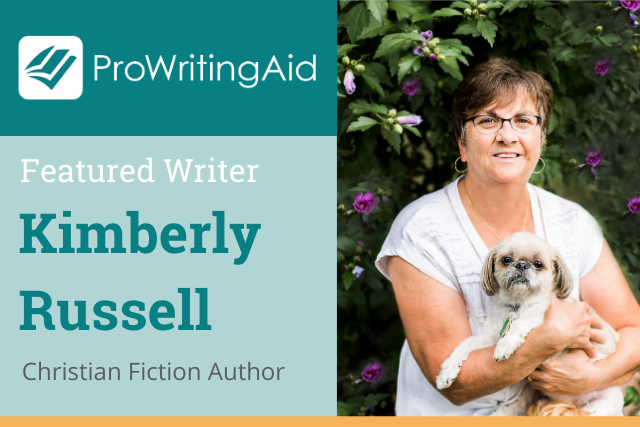
Kimberly Russell is an author of Christian fiction who will self-publish her first novel in the spring. Find out more about her editing process below.
Where do you find inspiration?
My current WIP is an allegory, inspired by the teachings of my church and journal conversations with God.
Tell us about your writing and editing process.
Long and drawn out! This project has been a five-year process due to life getting in the way. When I finally got into Scrivener, it took off. It is currently in final editing stages with self publication in the spring.
What do you love about writing and editing?
Not much about editing—although I’m getting better at it. I adore the creative process and getting lost in the world of my characters. It’s exciting to see what they do!
What do you find difficult about writing and editing?
Editing has been difficult only because I’m a novice—I had to come up with my own processes. After much research, starts & stutters, and revamping of to-dos, I feel like I have a handle on what works for me and I’m hoping my future endeavors will come off a little easier.
Which is your favorite ProWritingAid report? Why?
I love the Summary Report and then the ability to zero in on those things that I struggle with the most. It has made me a better writer, and I learn from it all the time.
About Kimberly’s work
You can find out more about Kimberly and her work at kimberlykrussell.com, and follow her writing journey on Facebook.
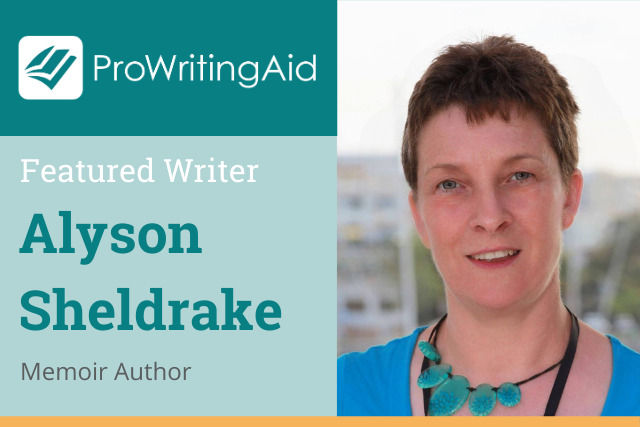
Alyson Sheldrake has written and self-published two memoirs this year, both about her family’s move to live in Portugal. She has four books planned for 2021, all compilations of stories.
Where do you find inspiration?
I live in the beautiful Algarve in Portugal. Inspiration is all around me. I also love meeting and chatting to other expats about their lives, and what inspired them to move abroad.
Tell us about your writing and editing process.
My first book was a completely new experience to me, and I had no idea what I was doing! The second book, my sequel, was written using ProWritingAid, and I completed an online diploma in editing and proof-reading. The difference between the two books was amazing. I get up at 5 a.m. each morning and write for 2 hours before the world is stirring and while my brain is at its most active.
What do you love about writing and editing?
I love the whole craft of writing, from the first germs of an idea forming in my head, to seeing it all come together on the page. Creating and self-publishing a book is a fantastic thrill, and I also love the marketing and promotion that runs alongside the writing.
What do you find difficult about writing and editing?
I paid for a professional editing company to format my books. I am happy designing my own covers, but the formatting part left my head spinning! It was money well spent.
Which is your favorite ProWritingAid report? Why?
I love Echoes. I am often astonished at how many times I have managed to use the same word or phrase—sometimes even in the same paragraph. This is a fantastic tool for spotting issues.
About Alyson’s work
You can find out more about Alyson’s work on her website and follow her adventures in Portugal on her blog. You can also follow her on Facebook, Twitter, Instagram, and Pinterest.
January’s Featured Writers: Judith Moffitt and Fred Berri
January’s featured writers were fantasy and science fiction author Judith Moffitt, and crime and murder-mystery author Fred Berri. Read on to find out all about their writing processes.
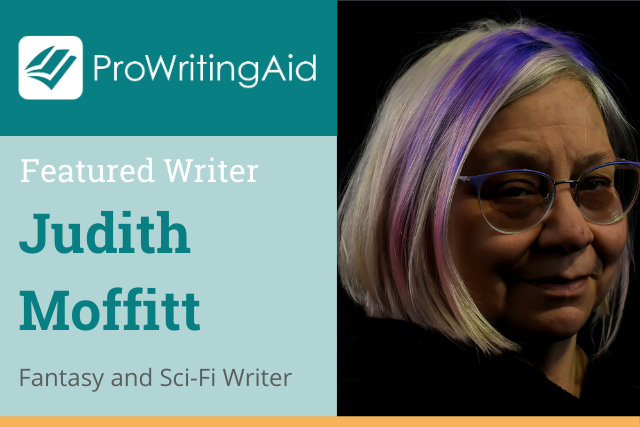
Judith Moffitt is a science fiction and fantasy author who also dabbles in essays and poetry. She loves world-building, and also publicly posts gratitudes for several months leading up to Thanksgiving.
Where do you find inspiration?
Inspiration is everywhere. One fantasy novel I am currently writing is based on my personal experience on the invisibility of widows. I saw an article about herders painting reindeer horns with bioluminescent paint and that will almost certainly become a fantasy short story.
The idea for my first novel came from a fan fiction for the TV show Firefly. A short story collection on swords came from a comment from a friend. The trans characters in my Coup trilogy are based on the ordinary lives (spouses, kids, jobs—not personalities) of some trans people I know.
Tell us about your writing and editing process.
Rough planning—I figure out the beginning, the end, and main characters. Then I write. After about six chapters when the characters and their interactions have become worn in, I go back and plan the rest of the book. I just do better when I get to really know the characters better before I decide what will happen to them.
Next, I compile the document, send it to my Kindle, and just read it as if it were a book written by someone else. I let it lie fallow for at least a month. I read it again and take notes. I create a list of structural changes I want to make. Then I write my second draft. I run the Scrivener file through ProWritingAid and polish. Then I read again and make notes of places to fix awkward sentences. I often read aloud at this point.
What do you love about writing and editing?
I am one of those people who is both strongly creative and strongly analytical. Coming up with ideas and doing the first draft feeds my creative soul. I shed ideas like mad. Currently, I have one science fiction novel and one humorous short story about dressage that I’ve published, three other stories in editing, five in drafting, and at least 10 ideas I haven’t gotten to yet. I also have a completed draft of a poetry book on grief that I am trying to figure out how to format for publication.
Editing feeds the analytical side of me. It’s easiest if you pretend you are reading someone else’s work. But figuring out what is working and what isn’t is a fascinating thing to do.
What do you find difficult about writing and editing?
I hate polishing the picky little things. I get bored and want to just move on. Then I miss things. It’s not that I don’t know where those pesky commas belong or that I need to close those quotation marks, but after a few minutes of this kind of editing, I stop seeing those things.
Which is your favorite ProWritingAid report? Why?
Given my previous answer, obviously the Grammar and Style reports are important to me. They take a lot of the drudgery out of getting all those picky little things right. The other report I find very useful is the Sticky Sentences. Fixing most of those will punch up my work quite a bit.
I love using ProWritingAid, but I think the key is that you have to use it analytically. Not all suggestions are right for your particular draft. You have to use your judgment to decide. Any five authors using ProWritingAid would take the same document and edit it in five different ways. The suggestions in any report are helpful, but not always correct for what I am trying to say. Still they point me in a direction. And I love that I can directly edit in my Scrivener project.
About Judith’s work
A Line in the Sand is a space opera about a governmental coup. It is the first book of a trilogy. You can find it on Amazon. The sequel is in the polishing stage and will soon be published. The third book is about 25% done.
Coming soon are two fantasy novels set in very different universes. Both have completed first drafts and are in the editing process.
You can find Judith on Facebook and Instagram.
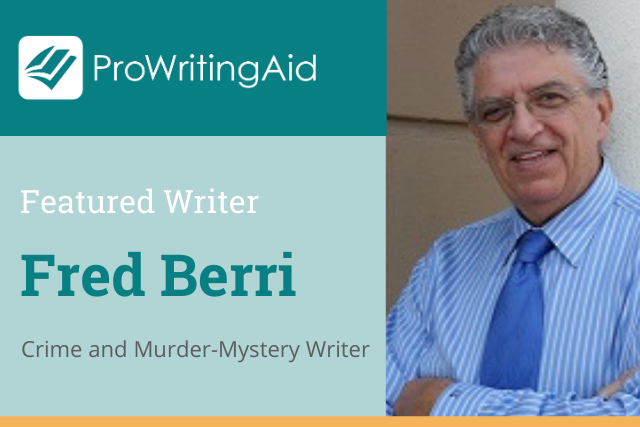
Fred Berri is an author of murder-mystery, crime, and children’s books. He uses ProWritingAid to feel confident in his editing at every stage.
Where do you find inspiration?
My tag line reads; "Twist, turn and bend the truth. Now it’s fiction."™
Tell us about your writing and editing process.
I set a certain time to write. Usually in the evenings. I use ProWritingAid to help me edit as I write. I prioritize a few categories for checking to be sure I have the basics covered before I go on to another chapter. Some like to blitz through and then go back. I don’t. After I finish, then I’ll go back to re-read and make changes. When that is done, I send to an editor for story content and suggestions for changes.
What do you love about writing and editing?
I love the creativity of writing. It’s a story that I have come up with and I love to share it with others. Using ProWritingAid helps me with the editing process. It’s easy to use and offers a lot of help.
What do you find difficult about writing and editing?
Although I create a plot and characters before I write, sometimes I come to a dead end, thinking “where I can take this story?” and “what would readers really like?” Even with a plot outline, I guess I’m a pantser writing by the seat of my pants.
Which is your favorite ProWritingAid report? Why?
I like the Readability Report because when the paragraph is easy to read, I know I can move on.
About Fred’s work
Fred’s work is available on fredberri.com, Amazon, and Barnes & Noble.
You can find out more about Fred and his work on LinkedIn.
Would You Like to Be Featured?
Submit your answers through this form for a chance to be featured this year! We’re looking for a whole range of writers—fiction, nonfiction, content marketers, academic, business, freelance, technical, or any other kind of writer.
We’d love to hear all about your writing process, what you love about writing, and what you find difficult.

